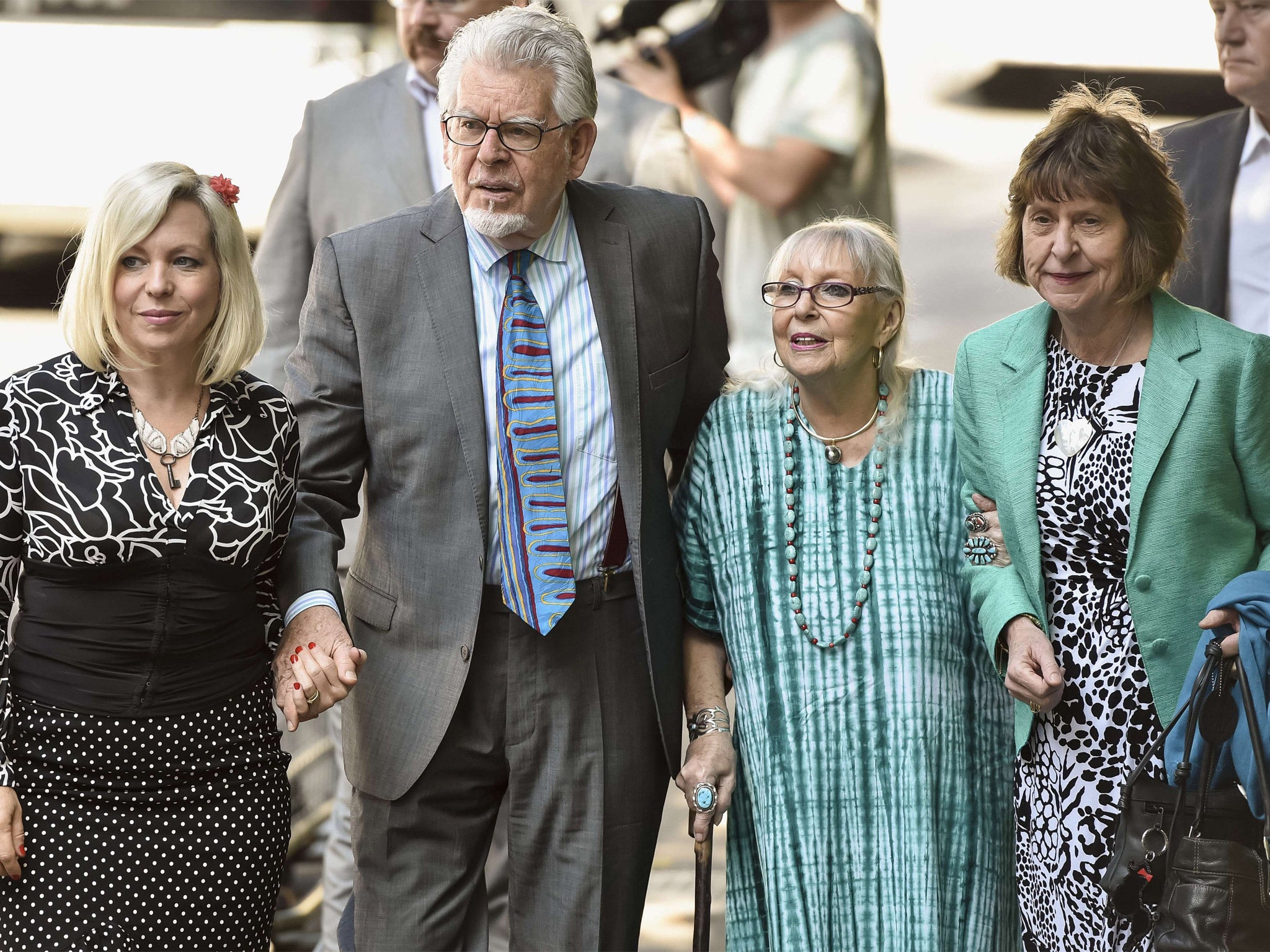Rolf Harris's other victims - his wife Alwen and daughter Bindi
How do the families of suspected sexual abusers cope when they are finally confronted with the humiliating truth after years of deceit? Charlotte Philby finds out

As Rolf Harris was found guilty of 12 counts of indecent assault on Monday, the shivers that ran through the courtroom were felt across Britain. How could a man who had endeared himself to millions as a warm and apparently harmless entertainer be capable of such horrifying crimes?
But for those who had watched the presenter arrive at court every morning of the six-week trial, flanked by his wife, Alwen, and daughter, Bindi, other questions sprang to mind. What must it be like to have a loved one accused of child sex offences? And how does one reconcile loyalty to family with the unequivocal guilty verdicts of a jury who had heard shocking details of the abuse he had perpetrated over decades?
Alwen Harris, 82, an eccentric former sculptor and jewellery designer who famously chose a poodle for her bridesmaid, decided to leave court hand-in-hand with a convicted paedophile on Monday afternoon, through a scrum of reporters and photographers to a waiting car.
What must the couple’s daughter, Bindi Nicholls, 50, an artist who now lives in north London with her husband and his family, have thought as she sat next to her parents in the back seat of that blacked-out car? The jury had heard that Bindi learnt of her best friend’s “affair” with her father – which the jury found dated back to when the girl was 13 – as early as 1997.
For so-called secondary victims, feeling the “ripple effect of abuse”, there are “lots of mixed feelings, confused emotions and divided loyalties”, says Dr Lynne Jordan, a chartered psychologist specialising in complex trauma.
Jon Brown, the head of strategy and development at the NSPCC, says: “Working with the families of offenders, we see this day in, day out. Abuse involves coercion and grooming – not just of the victim her or himself but of the abuser’s immediate surroundings. They are often conned and tricked and buy into what is happening.
When it comes to family, Dr Carol Burniston, a clinical child and adolescent psychologist, says emotional ties can be hard to sever. “We have an ability to separate the person from the action,” she says. “Our view of someone and who they are may change, but the feelings remain.”
Closer scrutiny of the family’s behaviour during the trial reveals a complex and carefully stage-managed performance, with Rolf and Alwen collecting their daughter from a nearby cafe before court, so as to arrive – and be pictured arriving – as a single family group.
After giving her own evidence, Bindi joined her mother in the gallery where Alwen kept her own cushion, emblazoned with the head of an animal wearing a crown. Alwen accepted a kiss from her husband after a particularly trying bout of evidence.
Wife and daughter were far from unaware of the adulterous side of Harris’s “Jekyll and Hyde” personality, even if they refused to believe he could be guilty of sex offences.
It emerged during the trial that Alwen, who has been married to the entertainer for 56 years, was not only suicidal as a result of his constant working, but that she had already learnt of an affair between Harris and Andrea Kingston, the housekeeper/mistress 20 years his junior who he had moved into a shed in the garden of the couple’s riverside house in Bray, Berkshire.
It was only when the affair was raised in court that Alwen showed any emotion, wiping away a tear.
During verbal testimony last month, Bindi Nicholls backed her father’s claim that he and his daughter’s best friend had had a consensual “affair” which started after the girl turned 18, dismissing as “laughable” claims that Harris had performed oral sex on the victim, aged 15, while Bindi slept in the next bed.
Bindi also revealed in court that she had undergone counselling because “it’s difficult being a daughter of a famous man”, making her loyalty even more remarkable. Prosecutor Sasha Wass attributed this loyalty to her financial dependence on her father, who gives her a monthly allowance.
In 2012 Bindi wrote to her father to ask if she was the sole inheritor of his £11m estate: “It’s like being told that you will be winning the lottery at some point so you get excited and dream about the things that you could do.”
The NSPCC’s Mr Brown says that as with any deep loss, there is a process of grief: “Denial, incredible anger sometimes against the victim as well as perpetrator, often followed by a depression. Often families go through these stages. They desperately want to believe there has been some tragic mistake. “
Having space to understand what has happened and how it happened is vital to healing, he says. “But it takes time.”
